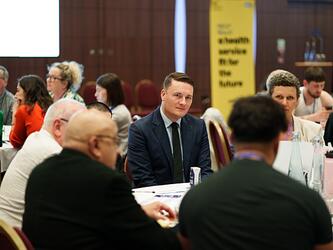Fixed decisions
Why is decision-making in business so difficult? David Wethey thinks he knows. It’s partly down to a lack of process and an over-reliance on logic at the expense of gut-feel. But personality also comes into play.
As chairman of Agency Assessments, Wethey has spent the past 25 years helping advertisers make decisions about which ad agencies to work with. As such, he’s spent a lot of time in board rooms watching teams of decision-makers try (and sometimes fail) to reach consensus. “I just became completely absorbed in understanding how some teams work really well together, how some teams are largely dysfunctional, and how apparently similar people could approach the whole question of choice in dramatically different ways.”
That experience has led Wethey to write a book on the subject, Decide: Better Ways of Making Better Decisions. You’ll find it on Amazon, alongside 7,000 other books about decision-making in business – which speaks volumes about just how difficult people find the whole process.
Team talk
If you want to make good decisions, getting the right team together is key, says Wethey. One of the big fallacies of decision-making is that it all comes down to an individual. “There is an assumption that this is the perfect default setting for decision-making,” says Wethey. “But that is completely unacceptable, even in areas that we tend to think of as being dominated by strong individuals – generals in war, for instance. It’s unthinkable in any armed force in the world not to have a democratic decision-making matrix.”
In any successful team they will be a mix of personality types. ‘Drivers’, as the name suggests, are fairly comfortable with taking decisions. “Their basic process is to look at goals and explore expeditious ways of achieving goals, then they take people with them,” says Wethey. CEOs, headteachers and senior medical consultants all overwhelmingly tend to be driver-types, he adds. “It’s very difficult to do those sorts of jobs unless you (a) have conviction, and (b) are seen by those around you to have conviction.”
Alongside drivers there are ‘amiables’, who like consensus and keeping everyone happy, and ‘analysts’, for whom “no debrief can ever be too long,” says Wethey. Unlike drivers, “analysts are very nervous about making decisions because they have a rigour about them that makes them averse to jumping to conclusions, while amiables are so keen to get the ‘people factor’ right that they prioritise that ahead of making what might be unpopular decisions,” he explains.
But while it might be tempting to just stick a bunch of drivers in a meeting room and let them do what they do best, Wethey says analysts and amiables have a crucial role to play. Each type of person brings something new to the table and is an essential part of a process that leads to sensible decisions being taken, having those decisions communicated internally, and having them acted upon.
“We’re obsessed with problems these days. It won’t be long before there is a Nobel Laureate for problem-solving because it’s become a high-grade hero activity. But to me problems are plumbing, by which I mean they are things that need to be dealt with and gotten out of the way so we can focus on something that really matters.”
Meeting the problem
Even with the right team in place, decisions may still be hard to make if you don’t fix the meeting process itself, says Wethey. Business can’t take decisions without meetings, but, equally, meetings often get in the way of decisions being made because too often they end-up being part social gathering, part support group.
Meetings have always performed a social function, but Wethey thinks the real problem is ‘problems’. “We’re obsessed with problems these days,” he says. “It won’t be long before there is a Nobel Laureate for problem-solving because it’s become a high-grade hero activity. But to me problems are plumbing, by which I mean they are things that need to be dealt with and gotten out of the way so we can focus on something that really matters.”
In business, Wethey says, people confuse problem-solving and decision-making. Too much time and effort is spent on deciding how to fix what’s broken whereas the real decision – the one that is of most strategic importance to an organisation – is what the course of action should be once the repair job has been completed.
“I think we’ve got to take an awful lot of problem-solving out of meetings,” he says. “Make it someone’s responsibility to deal with the problem and come back with a solution, and then spend the rest of the meeting talking about opportunities. This would make decision-making a lot easier,” says Wethey, “because you can’t make a decision until you’ve got a commodity called ‘options’.”
When it comes to weighing options, however, decision-makers need to be careful to keep their natural human optimism in check.
“In many aspects of our lives we get so taken up with the maximum possible upside that we forget the downsides,” says Wethey. “One of the functions of senior people in companies is to save the business from their worst excesses, many of which come from being terribly excited and becoming over-committed to the expectation that something good is going to happen, while ignoring the cliff on the other side.”
Take heart
Assessing the relative risks and rewards of any decision is a difficult thing. It takes people into the realms of the unknown and the uncertain – a place where logic and evidence can only carry you so far. Wethey advocates a balanced approach that mixes hard data and reason with “a healthy regard for emotion, gut-feel and heart”.
When so much of everything else that we do is governed by the subconscious, Wethey says: “It just doesn’t make sense to try to make a decision entirely on logic.” Management consultants – and for their part, some research agencies too – might be founded on the principles that all decisions within business should be based on a big stack of evidence, but if decision-makers never backed their hunches, the world would be a very different (and, some might say, duller) place.
Of course, there is no shortage of data on which decision-makers might base their decisions today. But Wethey asks: “How much data do you need before you can move forward? The answer, I think, is less than many people would think. Take battle, for instance. If you are in a tank or a submarine or a military aircraft you’ve got data to burn, but you can’t use it all. Unless the human can process it in time, it’s not useful. And the one thing we have learned nowadays is that in business, you have to make some fast decisions when the shit hits the fan.”
This article was first published in Impact, the new quarterly magazine from the Market Research Society. Follow the link to read the digital version of Impact.
Includes:
- A special report on customer experience
- Profiles of the Tate, SABMiller and Auto Trader, showing how they use data and insight to shape strategy and decision-making
- How the UK government’s Nudge Unit is changing policy development
- How hackathons can help data and analytics companies innovate

We hope you enjoyed this article.
Research Live is published by MRS.
The Market Research Society (MRS) exists to promote and protect the research sector, showcasing how research delivers impact for businesses and government.
Members of MRS enjoy many benefits including tailoured policy guidance, discounts on training and conferences, and access to member-only content.
For example, there's an archive of winning case studies from over a decade of MRS Awards.
Find out more about the benefits of joining MRS here.












0 Comments